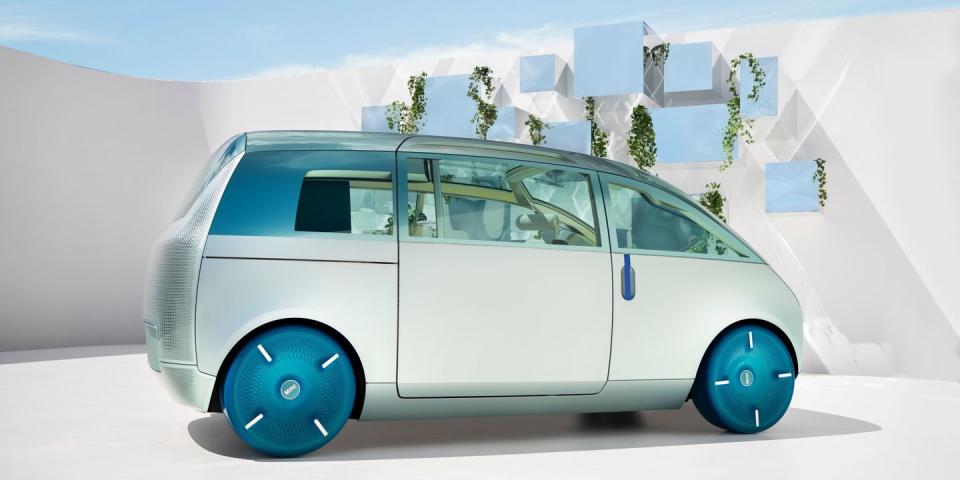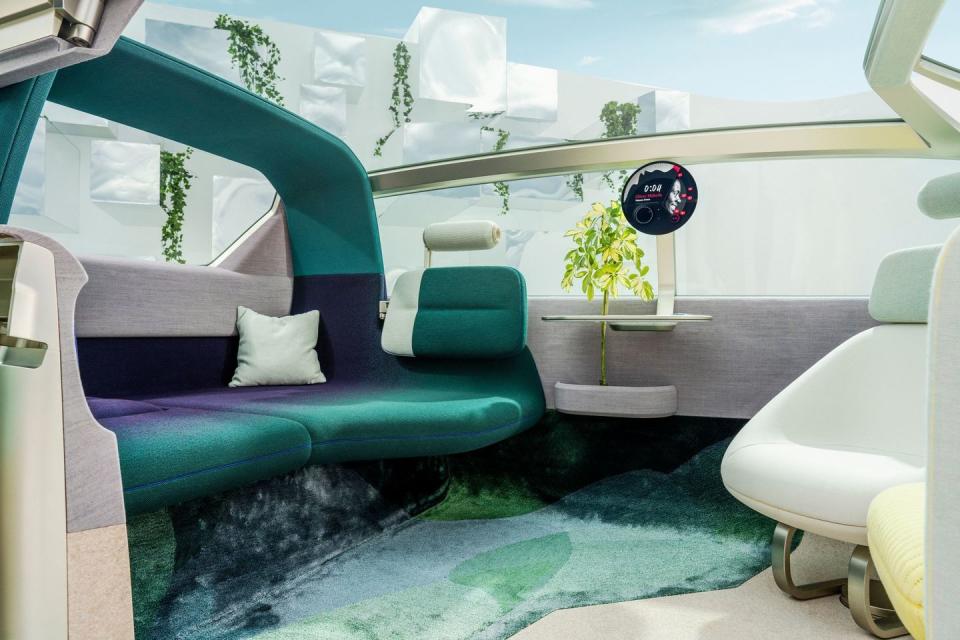Mini Hinting It Could Build the Urbanaut

Mini might make the Urbanaut concept, but not for at least seven years or so.
The concept has drawn much interest inside and outside Mini circles.
If built, it would roll on an electric skateboard chassis.
In its own miniaturized way, the Mini Urbanaut concept microvan has caused quite a stir. Not as much of a stir as the Volkswagen ID. Buzz due in 2023, but people are excited by the Mini concept’s shape, size, and partying utility. It’s a microbus on the outside and a lounge act on the inside, with modular seating that could host a litany of folks on their way to clubbin’. Or whatever the kids are doing nowadays. As part of the peripheral events that encircle the Los Angeles Auto Show, we got a closeup look at the Urbanaut and a chance to speak about it with Mini’s “Chief Motorer” and Vice President, Mike Peyton. This interview has been lightly edited for length and clarity.
Autoweek: So why make an Urbanaut concept?
Mike Peyton: I think the Urbanaut's a really good example of how we think. It will expand the brand. There's definitely thoughts on, how do we take some of that flexible styling and a lot of the sustainable design that Oliver (Heilmer, head of Mini Design) talked about, a lot of the materials that are in there. It's not too far away from what we think is possible; maybe it's a bit more mid-term, a little bit longer-term, but we think would still be a great fit for Mini, and make a lot of sense for Mini.
AW: A typical product cycle is about five years, say, so fast-forward five years from when you start electrification of Mini in 2023, that would be 2028. That's a ballpark that I just threw that out, you didn't, but would that be close to when we'd see a production Urbanaut?
Peyton: It might be somewhere in that realm. Because starting in late 2023 is when we really start to update the Mini portfolio, we start to add more electrified products. And then, once some of those are firmly planted in our portfolio, that's where we think there's kind of this growth and expansion phase, which gets us into some different properties I think keeps us relevant in more segments, and also modernizes certain aspects of our brand appeal, while still being very true to those Mini driving characteristics and all the things people come to expect from the brand.

AW: You have to go somewhere, right? For years it was just a Mini Hardtop 2 Door hatchback, then a couple of versions of that, followed by the Countryman and the Clubman. The products keep getting bigger. The notion of a microvan, I mean, the response that Volkswagen ID. Buzz has been fantastic.
Peyton: Yeah, for sure. It's retro and modern at the same time.
AW: It has character. People, I think, are desperate for character. I myself spent last night writing about a crossover utility vehicle and I was wanting to kill myself. This Urbanaut is something different and exciting. Are people crying out for something cool?
Peyton: Particularly for Mini, it's got to be cool. There's got to be some innovative aspect to it. And of course, we are always about that creative use of space, and I think the Urbanaut is probably the perfect example of that. If I want to have it be more of my chill space, the living room, or if I want to have space to have more of my friends with me, that's a perfect use for something like an Urbanaut. I can't tell you how many times I've had people come to me and say, "What's it like being the head of a small car brand in this truck and SUV world?" The reality is I'm not trying to be an F-series pickup and I'm not trying to be a Chevy Suburban and cart all the kids and all their stuff. We are that fun-to-drive, go-kart handling thing that's different, something that says we are still particularly in this part of the world, the second, third, fourth car in the household. I'm not your primary vehicle. And because of that, it allows you to have a little more fun with what we're driving and what we're providing. And we have had a lot of customers who have said, like with Countryman, they want something a little bit bigger, and they want something that maybe sits up a little bit more, but they still want all the Mini handling. And we have that today.
AW: You don't want to fall into being something like the Fiat 500X, which has some of your Countryman’s proportions without the same driving feel.
Peyton: Have you driven a new John Cooper Works Countryman?
AW: Sadly, no.
Peyton: It's my daily driver, a John Cooper Works All4 Countryman. It's got 301 horsepower. And it's just insane. It's so fun to drive. And it's just a perfect example of how you can still have a little bit larger overall greenhouse and still have all of the kind of cool quirkiness of Mini. But then you could literally take that thing out on a track and just have a blast on it.
AW: All true, no doubt. But sticking to the Urbanaut, for people to buy a new car, they usually have to be older, because they have to have money. I'm guessing a production Urbanaut is going to cost around $50,000, $40,000 to $50,000. Again, my guesstimate, not yours, but the young buyers to whom this is intended, all these beautiful hipsters in all your videos who go clubbin' together in Urbanauts, they don't have any money. So how do you address that?
Peyton: On any portfolio, particularly a Mini portfolio, we've got to acknowledge that we do have people new to the brand, and then we also have people that have been with us for a while. We're not necessarily an entry-level brand. We still see ourselves as a premium brand in the marketplace. Today we have vehicles that, optioned up, get into that $50,000 range, particularly, you're talking like a JCW Countryman. But we also feel that we always have to make sure that we are competitive in the marketplace, we've got to make sure that we are relevant with what the marketplace is demanding, and offering what customers are looking for. But today you could lease a Mini, there are different types of finance alternatives that are available out there which are helping more people get into Minis. The Oxford Editions very much have been something we've done to have a high value and a lower, more accessible price point. We've done that with Mini Electric as well. So I think you'll see that as a continued strategy for us in the future.
AW: One way for young buyers to have access to something like an Urbanaut would be to summon one through a service like Uber when they have a larger group all going somewhere. Uber and Lyft are still an option.
Peyton: Interestingly enough, in Spain right now Mini is testing a Mini sharing approach. It's leveraging our Mini app and using technology in the vehicle and allows you to actually take your circle of friends and share your car. If you and I were, you know, buds and you're like, "Hey, can I borrow your Mini Tuesday night?" I can give you access to an app where you can actually look at the app and say, "Okay, it looks like it's available at eight o'clock on Tuesday, I'm going to reserve it," and you'll use your phone to go unlock the car.
AW: One person owns it and rents it out?
Peyton: Yeah, to circle maybe 10 or 15 people. And so that whole concept, it's sort of Uber-like but more of the sharing concept. And so we're already trying that today. For Mini there's definitely some infrastructure you need to put in place to enable what I'm talking about, but it's definitely something we're already going down that path.
AW: A big thing about the appeal of the Volkswagen ID. Buzz van, or rather, the original model of that, was that it was available as a camper. Has that notion been bandied about when you guys were talking about the Urbanaut?
Peyton: Well, you think about all the things that are in Mni's history—we've had a Mini pickup we've had a Mini van. There's been all these different iterations. So I think you'll continue to see us really lean into it in the places we've been as a brand that have been part of our heritage and our legacy, but in a more modern fashion. I think you'll find there's been a lot of things that we've done in the past. I think there's portions of that which will materialize in our future.
AW: You've done a van?
Peyton: Yeah, the Clubman name was used on that before. It's really cool. I think it was the proportion of today's Clubman. It's still a smaller format.
AW: So Mini is going to continue to expand in exciting ways.
Peyton: Yeah, and obviously we're moving towards being an all-electrified brand. That's another element. And that's something that, when you take that Urbanaut concept, it gives you a lot more flexibility, using a skateboard-type platform, to do different things and consider different designs more flexible in their design so that's going to be an important part of our future. All-electric is what we're talking about by the early 2030s.

AW: Everything in the automotive world is going to be all electric.
Peyton: You look back on the last two years, it's been amazing how accelerated the move towards electrification is. That obviously very much helped Mini make the decision that that's where we need to move as a brand… An electrified Mini fits so perfectly to the brand. If you take the safety car we did for Formula E this year, the Pace Setter, which is an electrified, JCW-type vehicle, it shows you that electrification could be a lot of fun.
AW: So, should I hold off and not buy the Volkswagen ID. Buzz?
Peyton: Would you really ever want to buy a Volkswagen when you could buy a Mini?
AW: I guess I could lease a Volkswagen ID. Buzz, then the lease would be up and the Urbanaut would be out...
Peyton: I would think if you want to wait a bit into the future, you probably wouldn't be disappointed.
Share your thoughts on the prospect of a production Mini Urbanaut in the comments below.

 Yahoo Autos
Yahoo Autos 